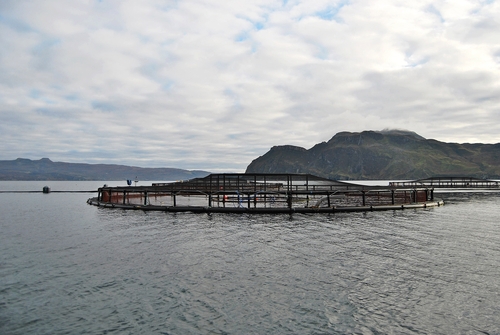Marine cages for fish farming at sea
Fish farming: preventing pollution from marine cages
 Waste from fish cages can have a negative impact on the environment. It can:
Waste from fish cages can have a negative impact on the environment. It can:
- smother bottom-dwelling animals and plants
- remove oxygen from the water
- increase the concentration of nutrients such as ammonia, nitrogen and phosphate.
Your discharge consent or authorisation will limit the number of fish held in cages to help minimise the impacts of fish waste.
What you must do
If you use chemical treatments in cages, you must comply with any limits on chemical use included in your discharge consent or authorisation.
SEPA (Scottish Environment Protection Agency) has implemented a revised regulatory framework to enhance the protection of the marine environment in Scotland concerning finfish aquaculture.
Key aspects are:
-
Pre-application Work: Before applying for a permit, operators must collect the necessary information required by SEPA.
-
Application and Issue of Permits: Once the required information is gathered, operators can submit their permit applications. SEPA evaluates these applications and issues permits based on environmental standards.
-
Compliance: Operators are expected to adhere to the permit conditions set by SEPA. These conditions limit the environmental impacts associated with fish farms.
-
Enforcement: SEPA monitors compliance and takes enforcement actions if necessary to ensure that operators meet the established standards.
The Protection of the Marine Environment, Discharges from Marine Pen Fish Farms: A Strengthened Regulatory Framework outlines the specifics of regulating discharges from fish farms. Additionally, SEPA plays a crucial role in managing the interactions of sea lice from farmed fish with wild salmon populations. This framework aims to maintain a high-quality marine environment for the people of Scotland.
Furthermore, SEPA’s Finfish Aquaculture Sector Plan introduces enhanced standards for organic waste, encourages improved siting and design of fish farms, implements better methods for licensing medicines, and strengthens monitoring and assessment processes.
Good practice
Place your cages in an area with good tidal flushing and water exchange so that waste is quickly diluted and dispersed.
Use fallow periods to allow the seabed to recover and help reduce sea lice populations. You can maximise environmental benefit by co-ordinating fallow periods at all fish farms that are close to one another.
New methods of dealing with fish lice are being developed. You could investigate the use of heat treatment or the use of cleaner fish.
Minimise the use of chemicals on your fish farm in order to reduce their impact on the environment. For example, you may be able to reduce the frequency of chemical application for sea lice treatment if all farms in an area treat their fish within a short timescale.
In Scotland, voluntary Area Management Agreements between farms have been used to co-ordinate sea lice treatments and stocking. This has maximised the effectiveness of the treatments and therefore reduced overall use of chemicals.
You should take care to ensure that oil or fuel used for boats is not spilt onto land or into watercourses.
When you harvest fish, avoid spilling dead fish or blood into the sea. Collect and remove all blood and fish waste. Take care not to spill any ice or water slurry into the sea.
Frequently monitor cages for dead fish and remove them from the water as soon as possible.
Recent developments in fish farming technology have introduced floating closed systems, where all wastes from the fish farm are collected, pumped ashore and treated. This greatly reduces the environmental impacts from wastes and also reduces the need for sea lice treatments.
